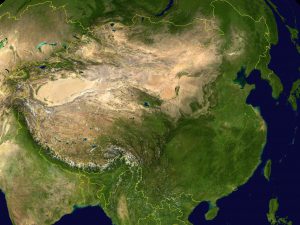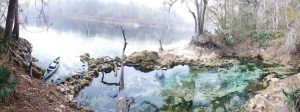This is a series of interviews with UF’s Department of Wildlife Ecology and Conservation faculty and graduate students. We’re asking each person the same set of questions about their lives, their passions, and how they do what they do.
Dr. Hull is the an assistant professor in the WEC department. She studies giant pandas and their ecology in China.
Work
When did you know you wanted to work in ecology? Is there an origin story?
When I was a small child, I was really interested in animals, and especially in pandas (I do research on giant pandas). So when I was five or six, I got a stuffed panda for my birthday, which I was very in love with, and over time I wanted to learn more about the species. I collected and read more and more and my interest grew over time.
What’s one word that describes how you work?
I try to work efficiently. Trying to manage a lot of different things at the same is one of the challenges of the job.
I think I know already, but what’s your favorite organism you’ve studied and why?

The giant panda is definitely my favorite, for a lot of reasons. There are many aspects of their behavior that are very different from other species. They forage on bamboo and have a really interesting connection to these plants. Evolutionarily their digestive system is, in many ways, built for a carnivore, so it’s interesting that at some point they switched their diet.
Their personalities are also very engaging. Just spending time with them in the wild, they’re very smart, very curious. Just very fun to study.
What’s an unexpected experience you’ve had because of your work?

I think the best thing about my work is getting to travel internationally. I’ve worked a lot in China, and that’s been an amazing experience. I spent several months over there in the field when I was a graduate student. I’ve had a lot of unexpected experiences, but I think getting to know the local people and living in a different culture in the place where I work has been very rewarding for me. Really getting to know people’s families and spend holidays with them while working in a protected area. Before I was in the field, I thought I would just work with animals. But actually, you work with a lot of different interesting people and learn about people’s identities and culture.
Some of my favorite memories are spending holidays with people. Chinese New Year is a big holiday over there, so families get together and make a lot of food. They would invite me into their homes to be part of their family celebrations. I would sit around the table with them and their families and talk to their kids about what they were doing in school and about what was going on in their lives.
Lifestyle
How do you manage your time?
That’s a good question.
I have two young kids. They’re four and one. I work a lot after they fall asleep. I try to take advantage of the time I have available every day. One of the most important things I think is to schedule times for teaching versus research, so setting aside days of the week that are more geared towards teaching and days that are more for research really helps, making sure you are dividing your time appropriately between those. That’s something that’s helped me.
How do you balance long periods in the field with your personal life?
Before I had kids, I would spend several months in the field, and I loved it. I had so much fun over there. I speak Chinese, so I have a lot of friends there. My time over there was really a mix of research and personal, in a sense, because it was just very enjoyable. I would also make sure to set aside the specific lengths of time I’d need to get the work done and try to be efficient about it so that I could come back and have time here.
Since I’ve had kids I’ve not been able to spend huge chunks of time in the field. Now it’s really a matter of becoming a lot more efficient about using my time so I can spend much shorter times away.
It’s important to make connections with people where I work so that relationships can be maintained after I leave. If it’s a trusted collaboration, then it can help with trying to maintain some presence in the field.
What are you currently reading?
Nothing! I’m reading research papers. I used to like to read novels, but since I had kids and my job really picked up, there’s not enough time.
What do you like about living in Gainesville?

I really like this area. I’m from Connecticut, and I did all my graduate studies in Michigan. That’s a really different climate!
I moved here a year ago and I’m really enjoying it. It’s really nice with little kids, because you can get outside a lot more here. We go to playgrounds, or just hike in different places like Payne’s Prairie and Sweetwater Wetlands. All the different parks are amazing. And all these different springs! The springs are beautiful. After we first moved here, we went through this period where we were trying to find the manatees. So we went to all of the different places where you can see manatees. It’s a really impressive thing, if you’re not from this area, to be able to see all of the different (Florida) wildlife. Alligators too! We were impressed with them especially when we first got here, before we got a little desensitized to them over time.

They weren’t like squirrels yet.
Right! They were not yet squirrels so we would get very excited every time we saw an alligator. The wildlife is really amazing.
In Closing
Is there one piece of advice you would like to share with students who will read this interview?
The main thing is to follow what you’re passionate about. I think when I was a student, especially when I was an undergrad, I had this notion that when I went out into the world there would be a lot of closed doors, that there would be a lot of gateways, or special people. I thought only special people got to do certain things. What I’ve found is that’s not true at all. It’s really up to you, if you have the initiative, the drive and fascination, you can really make it happen. My interest was going over to China and working with pandas, and it seemed like a huge task, but what I found was that people were very open and excited to work with me. It was a very welcoming and open environment.
I think if students have that in their mind they’re more likely to go out and be adventurous and try new things.
Who else would you like to see answer these questions?
Everyone!
Is there anything else you’d like to tell people?
Nope, that’s all! Thanks!
~
Interview by Richard Barker.
Lightly edited by Rhett Barker, Claire Williams, and Dr. Eric Hellgren for clarity.
Thanks to Dr. Hull for speaking with us.
The concept for this interview is based on an interview series by the University of Washington called How UW Works, which is in turn based on a series called How I Work by LifeHacker magazine.
 0
0
